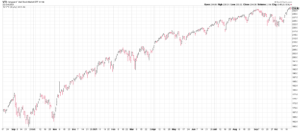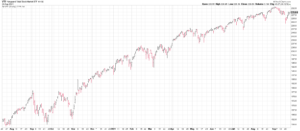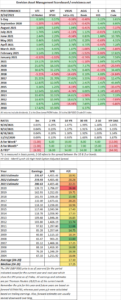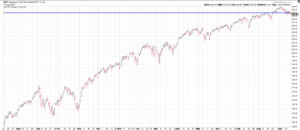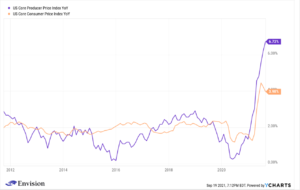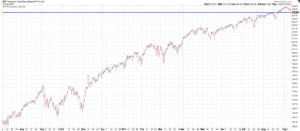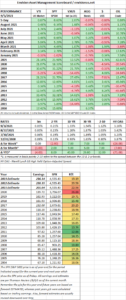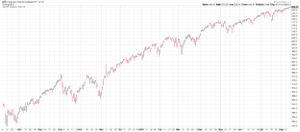Week Ending 10/22/2021
MARKET RECAP
Stocks finished the week just off the Thursday record high, up by 1.57% for the week. From September 2nd to October 4th, the overall US market fell by 5.1%. Since then, stocks have rallied and are now about 0.3% above the September 2nd close.
Stocks have managed to rally despite rising interest rates. The 10-year Treasury has increased from 1.19% on August 3rd to 1.66% as of Friday. Projected inflation is measured at 2.66%, the highest rate in 15 years. Over the last few weeks there seems to have been a shift from the mantra that inflation is “transitory” to something that will be a bit longer, maybe a lot longer, than that. The Fed has indicated that tapering will start in November. Oil prices are at the highest level since 2014. Estimates for economic growth are falling. The Atlanta Fed’s GDP model now projects Q3 growth at only 0.5%. In China, the Evergrande Group, the real estate behemoth, is on the edge of bankruptcy, with a likely negative impact on the Chinese real estate sector, which represents 30% of China’s output. None of this seems to matter to the market, which is back at new highs.
Exxon is supposedly considering dropping several oil and gas projects, as directors are worried about carbon emissions. This at a time when energy prices are surging and capex across the industry is falling. Exxon’s board took a turn when a hedge fund with a 0.02% interest, Engine No. 1, managed to get their nominees added to the Company’s Board.
SCOREBOARD
Week Ending 10/15/2021
MARKET RECAP
US stocks were up by 1.9%.
Surprise, inflation was up more than forecast in September, increasing by 0.4% from August and up by 5.4% year over year, the biggest increase since 2008. Supply chain issues, higher commodity prices and wages get the blame. The report confirms that the Fed will need to start tapering soon.
The combination of higher inflation and the hit the economy took from the Delta virus is weighing on economic growth. The Atlanta Fed now expects Q3 growth of only 1.2%, this is down from over 6% at the end of July. A JPM survey shows that 42% of respondents expect stagflation somewhere down the line. The good news is that Covid cases have been on the decline since August.
The copper/gold ratio hits its highest level since 2013 indicating strength in industrial demand.
SCOREBOARD
Week Ending 10/1/2021
Durable goods hit a record in August, up 1.8% from July to $263.5 billion. Durable goods are product meant to last three years or more. The estimate was for a 0.6% increase. The big increase indicates that businesses are investing for the future.
Home prices continued to increase at record rates in July. It was the fourth straight month of record increases. The S& P CoreLogic Case-Shiller National Home Price Index was up 19.7% in the year that ended in July, up from an 18.7% annual rate in June. July marked the highest annual growth rate since the index began in 1987.
But the pace of increases might be slowing. The Conference Board’s consumer-confidence index fell to 109.3 in September from 115.2 in August and the share of respondents planning to buy a house in the next six months fell for the third month in a row.
Week Ending 9/24/2021
MARKET RECAP
A quick note this week, US stocks managed a 0.58% advance while international stocks fell by 0.38%. Stocks fell hard on Monday, almost 2%, on worried about the pending default of China Evergrande Group, the big Chinese property developer. They are on hook for about $300 billion.
But by Wednesday stocks were back in rally mode and close out the week with three consecutive advances.
During the week the Fed said it would begin to slow down on its bond buying program, but that was expected, at least to the stock market. Bond yields jumped by 10 basis points on the 10-year.
SCOREBOARD
Week Ending 9/17/2021
MARKET RECAP
The market fell again this week, although not much, down by 0.45% in the US and 1.18% outside the US. High valuations, an economy that is still growing but slower than originally thought, inflation, proposed tax increases, and tapering around the corner have stalled the market out, at least for now. In what might be an ominous sign, the market did not hold support as we wrote about last week. Now stocks certainly didn’t collapse, but they finished the week just under the mid-August highs.
One problem is that producer prices (purple line below) have been rising much faster than consumer prices (orange line below), meaning that companies have not been able to pass on the rise in recent cost inputs. Should the higher inflation numbers turn out to be “temporary” than maybe the impact won’t be that bad, but if not, it will impact profits and growth.
Another issue is Evergrande, the huge Chinese property developer. With $300 billion in debt, the company is on the brink of default. For now, the Chinese government is playing hardball and has not indicated it will provide financial help, so there is the threat of a spillover into world financial markets.
SCOREBOARD
Week Ending 9/10/2021
MARKET RECAP
US stocks were down by 1.83% and international equities were off by 0.80% for the week. Stocks closed at the low on Friday and are resting right on the support level from mid-August.
Damage from the Delta variant is starting to show up in the economy. Offices are delaying opening, businesses are pulling back on travel, and spend-happy consumers are slowing down. Hiring in August came in way less than expectations, and the University of Michigan consumer sentiment poll taken in late August fell to the lowest level in a decade.
The Atlanta Fed’s GDPNow model is currently estimating 3.7% growth down from 5.3% at the start of the month. Over the last week, economists across the board have cut their growth forecasts.
Delta gets most of the blame, but the ending of government aid also plays a part. A recent Census Bureau survey shows that 41% of households said they used some form of government assistance to help with everyday expenses.
At the same time that economists were cutting estimates, some analysts are becoming cautious on US equities. Bank of America is projecting 4260, that is 4.7% below the Friday close, and 4600 at the end of next year, up 3% for next year. Morgan Stanley moved US stocks to “underweight” with a preference for Japan and Europe, and an overweight in cash. “Morgan Stanley strategists forecast cash to outperform U.S. equities, government bonds and credit over the next 12 month”, said a note from the firm.
SCOREBOARD
Week Ending 9/3/2021
MARKET RECAP
Stocks were up in the US by 0.67% and by 2.07% outside the US.
August jobs were up by 235,000 but that was dramatically below the 750,000 estimate, but the stock market didn’t care. The market will turn every piece of news, good or bad, into a reason to for stocks to go higher. However, the the Initial Jobless Claims report was good. Ithit a new pandemic low coming in at 340,000 for the week ending August 28th.
August closed out on Tuesday and stocks were up for the 7th straight month, the S&P was up by 2.4% while the Nasdaq increased by 4% for the month.
At least one area of irrational exuberance has cooled off. The SPAC market has lost $75 billion in market cap over the last six months. That is about 25% of the combined value of the 137 SPACs that merged by mid-February. During that same period, IPOs that came public were off about 12% while the Dow Jones Industrial Average was up 13%.
Home prices continued to hit records. The S&P CoreLogic Case-Shiller National Home Price Index rose 18.6% year over year in June, up from 16.8% the prior month, and the highest annual rate since the index began in 1987.
West Virginia Senator Joe Manchin wrote a good common-sense editorial on “Why I Won’t Support Another $3.5 trillion“. Manchin sites the risk of inflation, runaway debt, the future unknowns of the pandemic, the problems with artificial deadlines, and the impact on future generations.” Lets see if it makes any difference.
SCOREBOARD
Week Ending 8/20/2021
MARKET RECAP
Fed officials are getting close on an agreement to begin a tapering program in a few months. An end-date hasn’t been set yet, but some Fed officials are pushing for mid-2022.
Businesses around the world are sitting on a stockpile of $6.84 trillion according to S&P Global. This is based on second-quarter earnings reports. That is up by 45% from five years ago and 2.6% greater than last quarter. Despite being flooded with cash, corporate spending is expected to decline by 5.8% this quarter, down from 12.9% last quarter. Many companies are holding on to cash until the virus clears. Part of the cash buildup was due to dividends cuts and cancelations of share-buyback programs. Then you have huge amounts of debt being raised to take advantage of low interest rates.
SCOREBOARD
Week Ending 8/13/2021
MARKET RECAP
US stocks were up by 0.56% and international stocks increased by 0.81%. The US market closed at another high while international stocks are still off of their June highs.
Producer prices increased by 7.8% year over year in July, indicating that the “transitory” inflation is so far a bit more than the Fed ever expected. Meanwhile, the Senate is working on a $3.5 trillion package, at the same time they are getting closer to passing a $1 trillion infrastructure package, on top of all the trillions thrown in to the economy last year, and they wonder why prices are up?
Barry Knapp, director or research at Ironsides Macroeconomics, said in Barrons this weekend, “We have this setup now that is very similar to the 1960s, which led to the Great Inflation of the 1970s.”
There were more jobs available in the US in June than at anytime. Unfilled job openings increased by 590,000 in June to 10.1 million unfilled jobs. That exceeds the number of unemployed by more than 500,000.
An article in Bloomberg on Saturday says analysts are the most optimistic in two decades. About 56% of recommendations are buys, that is the most since 2002. This coming when markets are at all-time highs and valuation metrics are stretched.
SCOREBOARD

